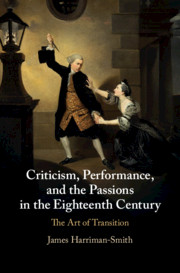
-
Select format
-
- Publisher:
- Cambridge University Press
- Publication date:
- March 2021
- March 2021
- ISBN:
- 9781108890847
- 9781108835497
- 9781108812832
- Dimensions:
- (229 x 152 mm)
- Weight & Pages:
- 0.5kg, 250 Pages
- Dimensions:
- (229 x 152 mm)
- Weight & Pages:
- 0.367kg, 250 Pages
You may already have access via personal or institutional login
Book description
Great art is about emotion. In the eighteenth century, and especially for the English stage, critics developed a sensitivity to both the passions of a performance and what they called the transitions between those passions. It was these pivotal transitions, scripted by authors and executed by actors, that could make King Lear beautiful, Hamlet terrifying, Archer hilarious and Zara electrifying. James Harriman-Smith recovers a lost way of appreciating theatre as a set of transitions that produce simultaneously iconic and dynamic spectacles; fascinating moments when anything seems possible. Offering fresh readings and interpretations of Shakespearean and eighteenth-century tragedy, historical acting theory and early character criticism, this volume demonstrates how a concern with transition binds drama to everything, from lyric poetry and Newtonian science, to fine art and sceptical enquiry into the nature of the self.
Reviews
Criticism, Performance and the Passions in the Eighteenth Century is an impressive study of the theory and practice of eighteenth-century acting. Focusing on ‘transition' as a key component of the actor's art, James Harriman-Smith offers us a new way to understand and appreciate the emotional power of theatrical performance in the age of David Garrick. Conceptually astute and deeply immersed in primary sources, his book is a major contribution to British theatre history.
Richard Schoch - Queen's University Belfast
Harriman-Smith's strikingly original work is on the performance of ‘transitions' – emotional turns from one passion to another – in the long eighteenth century. Using information gathered from plays, letters, manuals on speaking and acting, promptbooks, periodicals and paintings, Theatre and the Passions in the Eighteenth Century: The Art of Transition shows how ‘jolts' in the passions affected everything from David Garrick's performances to the writing of lyric odes and the construction of Shakespeare criticism. The extraordinary insights offered by this book will transform our understanding performance and text in the eighteenth-century.
Tiffany Stern - University of Birmingham
‘The Art of Transition is a welcome and even thrilling book because it offers its reader a new word for thinking about - and through that word, a new way of reading - the eighteenth-century archive.’
David Francis Taylor Source: The Scriblerian and the Kit-Cats
‘This is a welcome and even thrilling book because it offers its reader a new word for thinking about - and through that word, a new way of reading - the eighteenth-century theatrical archive.’
David Francis Taylor Source: The Scriblerian and the Kit-Cat
Contents
Metrics
Altmetric attention score
Full text views
Full text views help Loading metrics...
Loading metrics...
* Views captured on Cambridge Core between #date#. This data will be updated every 24 hours.
Usage data cannot currently be displayed.
Accessibility standard: Unknown
Why this information is here
This section outlines the accessibility features of this content - including support for screen readers, full keyboard navigation and high-contrast display options. This may not be relevant for you.
Accessibility Information
Accessibility compliance for the PDF of this book is currently unknown and may be updated in the future.


